|
|



|
|
|



|
|
check out metaljudgment.com for concert and album reviews |
|
www.metalupdate.com 
September 8, 1999 |
|
�����������������������������������������������������������������������������������������������������������������������������������������
Each summer since 1987, Metalheads around the globe have made the pilgrimage to Milwaukee, Wisconsin, for the Milwaukee Metalfest. Through the darkest days of metal this annual celebration of all that is metal has persevered and even thrived under its founder and driving force, Jack Koshick. In 1999, Jack fought not only the metal wars, but the Wisconsin Governor's office as well, staging the event despite political pressure, and last-minute venue and artist cancellations. Now Koshick is turning things up a notch and taking Metalfest on the road in 1999-00. The Metal Update caught up with Jack to discuss the past, present and future of this North American metal institution. |
|
�����������������������������������������������������������������������������������������������������������������������������������������
Metal Update: How would you describe Metalfest to the uninitiated? Jack Koshick: North America's premiere underground heavy metal festival. Its been my labor of love for the last thirteen years. I started it in 1987, with fifteen bands in one afternoon at the Eagles Ballroom. The Headliner that year was King Diamond - plus Trouble, whom I was managing at the time, and were on tour with King. Nuclear Assault was on the show. Death was on the show. Death Angel. MU: You emphasized the word "underground". JK: There are a lot of acts that have contacted us over the years that just didn't seem to fit in with what we were doing, that have had a lot of commercial success over the years. MU: Like who? JK: Just today I passed on Lynch Mob and Yngwie Malmsteen. MU: Do you personally make those decisions? JK: Yes, but I've got help. Don Decker helps quite a bit, and some of the other people here who work with me live and breathe it. |
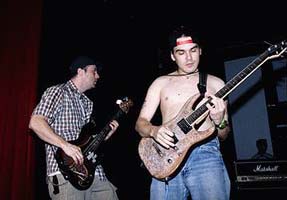 | 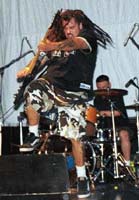 |
| Soilent Green | Skinlab |
|
�����������������������������������������������������������������������������������������������������������������������������������������
MU: Are you, yourself, a metalhead? JK: Yes I am. I can say that I've had to diversify because of my job, in the past, as a talent buyer, when I worked for Broadway Entertainment, I had to familiarize myself with everything. But there was a time when I used to manage a bunch of metal bands, like Trouble, Exploited, Dr. Know, Death, Deicide, and Cannibal Corpse. MU: You're a veteran! Why in 1999 is it still important to you to keep Metalfest about underground acts? JK: It's non-conformist. I kinda like that. If you came to my office - I operate out of my home. There's really nothing here, with the exception of a couple of computers and piles of paper . . . I guess, we're not corporate. We don't have that corporate structure to us. And, quite honestly, I like it that way. I'm not looking to be corporate. MU: So let me get this straight, you appreciate the vibe and honesty of underground metal, and that's more important than making a few bucks? JK: Quite honestly, Metalfest lost money seven of the thirteen years. This year was a mega-loss. I took a major hit. |
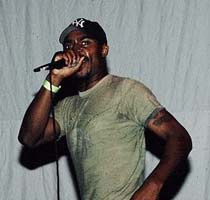 | 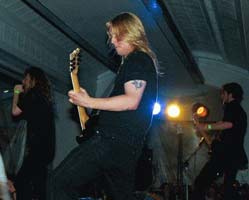 |
| Candiria | In Flames |
|
�����������������������������������������������������������������������������������������������������������������������������������������
MU: Let's talk about that. It almost didn't go down. Maybe it had something to do with it being the thirteenth year. JK: Well, no. To me thirteen . . . I was born on the thirteenth of August. To me its a lucky number. MU: Then perhaps the luck of the number thirteen helped to ensure the show actually would go on! Was there a point where you thought this thing wasn't going to happen this year? JK: Never for a moment did I think it wasn't going to happen. MU: Why did the Fairgrounds pull the plug on you? JK: Some things happen underhandedly. Competitors trying to . . . this is one thing that will probably come out if my lawsuit actually ends up in court . . . MU: . . . you're still pursuing legal remedies? JK: I filed a 5.9 million dollar claim against the State of Wisconsin. Breach of contract. See, when they pulled the plug on us, with all the negative publicity, people didn't know if the show was happening or not. Ticket sales just died. MU: How many people ultimately showed up to this year's festival? JK: There were about 6,000. There should have been 12,000. 10-12,000. That would have been a record crowd for Milwaukee Metalfest. But, Eric, we were on pace to do that number. |
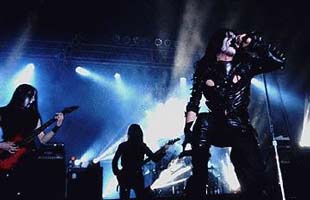 |
| Cradle of Filth |
|
�����������������������������������������������������������������������������������������������������������������������������������������
MU: Was the problem they had with the types of acts? JK: There was a guy who was the Governor's chief of staff, who from what I understand got fired over this. MU: Why? JK: The publicity and the heat made the Governor's office look pretty ugly. They pulled the show because he didn't like the names of the bands. They never really gave us a reason, but he said that they were horrified at the names of the bands that were playing, citing Cradle of Filth, Anal Blast, and Orgy With Pigs as the three bands he was focused on. And he was also offended by the fact that were going to be adult film stars signing autographs. MU: Why didn't these factors get taken into account before they agreed to host the event? JK: The State Fair had been courting us for two years to move there. MU: And you always remained sure the show would go on, no matter what? JK: I wasn't going to let it die! |
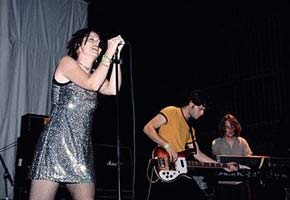 |
| The Gathering |
|
�����������������������������������������������������������������������������������������������������������������������������������������
MU: Did you have the Milwaukee Auditorium in your back pocket the entire time? JK: They wanted it the entire time. I had two places in mind to move the show, one of them being the Auditorium. MU: How do you think it worked out? JK: I thought the Auditorium was perfect for the event. MU: Might you go there next time? JK: I'm planning on it. I need to renegotiate my deal there because the people at the Auditorium basically were told by their boss, a Republican, to stick it to me. So I paid way more money than I've ever paid for that building, in all the shows I've ever done there.? MU: How important was it to ensure the event went on, to continue the continuity and to accommodate the folks who had made commitments to travel there? JK: It had to happen. There was no turning back. If the thing was to play in my sister's back yard, it was going to happen. MU: What happened with some of the headliners pulling out? JK: Nothing. MU: But you've had that happen in the past. JK: It has happened in the past but . . . for instance, take last year. Cannibal Corpse didn't play. They were advertised on the show, but on the way to the gig their bus broke down. And they ended up sitting on the side of the road somewhere between here and Champaign, IL. They wanted to play. I wanted them to play. But sometimes things like that happen. MU: Maybe it's just something that's bound to happen when you have that many acts on the bill. JK: We had 166 bands booked on the show and 161 played. MU: Why didn't Machine Head appear this year? JK: That's a good question. They didn't play because, what I gather, they didn't like some of the other bands that were on the show. |
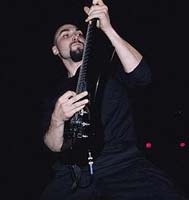 | 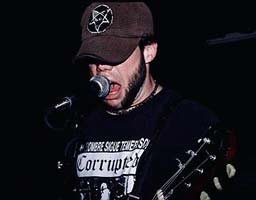 |
| Immolation | Bongzilla |
|
MU: What kind of commitment did you have from Machine Head before you advertised them as performing? JK: I had a contract. MU: But they turned around and just decide they didn't want to do it later? JK: That's exactly what they did. It's quite strange. MU: When you got the cancellation call, did you just say "fine," or did you try to fight it? JK: Nah. I'm not gonna fight it. If they want to be . . . for starters, I was insulted that they didn't think the lineup was cool enough. MU: What do you mean, "cool enough"? JK: Cool enough for them. MU: How commercially successful the bands were? JK: Exactly. And as far as I'm concerned, that's a sellout. |
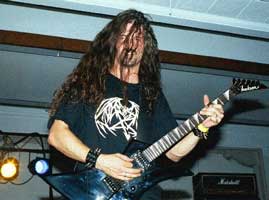 | 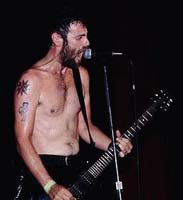 |
| Pessimist | Today is the Day |
|
�����������������������������������������������������������������������������������������������������������������������������������������
MU: What about some of the other acts? What about Manowar? JK: Well, they were in Europe, they were gonna try to shorten their European tour to play the Milwaukee Metalfest. Once again, we had a contract. That was a situation where the European tour was extended for three weeks. They were already in Europe. Now, Morbid Angel is co-headlining one of the days at the Texas November to Dismember. Morbid Angel was originally on the show in Milwaukee. What happened there was one of the guys in the band's wife was having a baby. They had called me almost two months ahead of time and told me the baby was due that day. If he was here when the baby was born, he'd never live it down. He really wanted to be there when it happened. So I said, that's fine. Marduk, Marduk just never got on the plane. That was a weird one. They didn't return my call, they didn't return Raychelle's call, they didn't return the Mexican promoter's phone call, they didn't return Herve's phone call. They just vanished. So what do you say about guys like that? MU: None of it had anything to do with the last minute problems in securing a venue? JK: I don't believe so. Maybe Machine Head - it might have had something to do with Machine Head. It might have had something to do with Manowar, I don't know. MU: How stressful is all of this? Do you take it in stride? JK: Well ,for the most part, bands don't cancel. For the most part, I'm saying "sorry, I'm filled." Each year I try to make the event better and better. I added wrestling, we enlarged Vendorville, which has actually gotten to be just as popular as one of the bands. MU: Let's go back to the beginning. How did you get to this point in your career? JK: I'm a concert producer. I've probably presented over 2,800 shows. I've been in the business since '73. I was an agent in England when the punk explosion happened. While I was there, I signed several punk bands and brought them to America . . . MU: Where are you from Jack? JK: Milwaukee. Acts I used to manage over the years, Badfinger, Sweet, Exploited, a bunch of other groups. MU: How did Metalfest get started? JK: I got the idea from a Slayer/Overkill show at the Eagles Ballroom in the fall of '86. One of my assistants, who is a real good friend of mine, said "god Jack - wouldn't it be great to have all of our favorite bands playing all at the same time." Then he went in the army three weeks later! But that kinda gave me the idea. MU: Did you set out to build a yearly event? JK: We went to try it. Wrestlemania was big, so the first Metalfest was called Metalmania. King Diamond, Trouble, Nuclear Assault. It was Death's first show out of Florida. One of Death Angel's first shows out of their home state. |
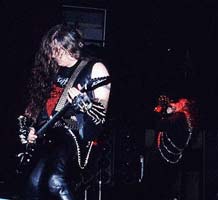 | 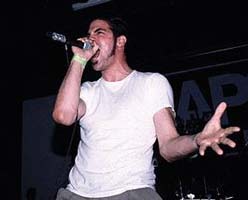 |
| Usurper | The Dillinger Escape Plan |
|
�����������������������������������������������������������������������������������������������������������������������������������������
MU: When did you realize this would be big? JK: I realized it that day. It was just plain magical. Everything went perfectly. MU: How many people attended that first event? JK: It wasn't that big. Maybe 1,600 people. But for something like that . . . back then Slayer was making $2,000 a night. So you have to put it in its proper perspective. MU: You've kept this up through some of metal's darkest days. JK: Metalfest IV, I was just hating life. MU: When was it the worst? JK: Metal was at its peak when Guns 'N Roses was on top. The year after that, metal went into a severe decline as far as sales and attendance for metal shows go. Some markets, it almost became extinct. But we've been able to keep the torch burning in Milwaukee. And the scene has been growing in Milwaukee. And Since '95 I've been working with the World Wrestling Federation, as a local event consultant. And I noticed that when wrestling picked up, so did metal. MU: You're definitely big on the connection between metal and wrestling. JK: Oh, absolutely. It was almost parallel. MU: Are you doing business with metal shows more than ever before? JK: The last couple years, business with Metalfest has been really, really good. This year's Metalfest would have been the biggest ever had we not had the problems we ran into with the State Fair Park. I can tell you right now, the dollars we lost in Milwaukee would have put a lot of people out of business. MU: Well we appreciate it! You do realize the role Metalfest has played in carrying the torch for the underground scene over the years? JK: When metal was dark, when sales were dark, around the early nineties. I went out and got a job driving a Greyhound bus. But I was able to take the money I was making there to keep it going. MU: What acts have played Metalfest over the years? JK: Everybody but Ozzy and Metallica. Anybody else you can think of has been there. MU: Who do you think were this year's highlights? JK: This year the band that really blew me away was The Gathering. I was really impressed with them. And In Flames. MU: Have you recorded the shows over the years? JK: No. MU: So there is no forthcoming 'Best of Metalfest 1987-99' double live CD? JK: As much as I'd like to . . . we were going to do that this year, but with the move from the State Fair to the Auditorium, with that being a union building . . . we lost a bundle. We didn't just lose the recordings. I had to cancel a pay-per-view. I lost a live album deal. I lost a live video deal. The only sponsor I ever had in the history of Metalfest, Camel cigarettes, went away because of it. MU: Do you think you can do some of this stuff in the future? JK: I thought this one was magical because it was number thirteen. You only get one shot at thirteen. So, is that gonna happen or will that happen in the future? It would be nice if it did. But now, its too early to say. MU: A live album would be a great idea. JK: We did a live album at Metalfest VI. But it ended up being primarily Restless Records acts. MU: Looking forward, you're taking Metalfest on the road. JK: It's something I've been wanting to do for years. I've had offers from different agencies to package Metalfest and take it on tour. But that, I think, would be a sellout. |
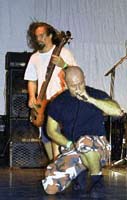 | 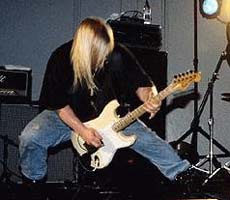 |
| Lungbrush | Nile |
|
�����������������������������������������������������������������������������������������������������������������������������������������
MU: What do you think of Ozzfest? JK: Ozzfest is a . . . I don't want to say "watered-down," but its certainly a more commercially accepted version of a metalfest. MU: Is there room for a summer underground metal festival tour? JK: Metalfest is not just a show you take from town-to-town. It's an experience. Taking it to every town would take away some of the appeal. MU: How many are you doing this year? JK: We're looking at four in the next twelve months. Next we are in San Antonio, November 5th and 6th, the November to Dismember: the First Annual Texas Metalfest. 100 bands, three stages. Confirmed, we have S.O.D., Morbid Angel, Pissing Razors, Crowbar, Face of Anger, Diabolic, Skinlab, Anal Blast, Embodiment, Fleshgrind. That's our start. We'll also have WWF wrestling, like we did in Milwaukee, which was a lot of fun this year. It was a blast. and Jasmine St. Claire will be there with her friends. MU: Is she into the music? JK: Totally into the music. That's how I got her. MU: Are these regional shows, or do you expect people to fly in? JK: If you can't move Mohammed to the mountain, you take the mountain to Mohammed. Is that the phrase? For those who don't have the wherewithal to come to Milwaukee the last weekend in July every year, here is something a bit closer to their homes. But we're not doing Milwaukee, Detroit, Chicago, Cleveland, Columbus, Pittsburgh . . . The plan is to do Milwaukee, San Antonio, Asbury Park, NJ, Los angles - most likely San Bernadino at the Orange Pavillion on the 7th and 8th of May. And then look to go to Tampa, look to go to Denver, look to go to Montreal, and Mexico City. End it there. MU: You still will book some unsigned acts? JK: Yes. MU: Do they have to "pay-to-play"? JK: Well, the pay-to-play situation works like this. It's real hard to put a lot of bands on the show who can't contribute to the event, fanwise. I'm a nice guy, but in Milwaukee, it cost me roughly $700 per band. Stagehands, security, etc. That's why I look for bands that can help offset that cost. Tickets are $55 a piece. We ask the bands to buy twenty. We sell them to the bands at $50 each. So if they sell them all to their friends, they should have $100 left over to offset their gas or other expenses. They'll also get a ticket to eat the day of the show, and a souvenier laminate to add to their collection. And they get to put Metalfest on their resume. MU: Plus the exposure of playing in front of a couple thousand people, potentially. JK: Every year somebody gets signed at the Metalfest. Last year Darkmoon got signed to Music for Nations. MU: What unknown bands played Metalfest who have gone on to big careers? JK: Some bands played for $50 who are huge now. Korn, Coal Chamber, Sevendust. all of them played Metalfest. Their first and second times through, they were playing for virtually nothing. |
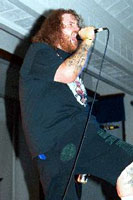 |  |
| Anal Blast | Dying Fetus |
|
�����������������������������������������������������������������������������������������������������������������������������������������
MU: How do you choose the headliners? JK: I deal with the agents. Joe Arnett deals with the unsigned bands. Ryan Olsen works here too, who runs the Mainstream Metal shop, a record store in Milwaukee. And Don Decker, who lives, eats and breathes it. He owns Nightfall Records in Minneapolis and Chicago, and he's also the lead singer of Anal Blast. Decker and Arnett usually handle the placement of the bands. Decker works on the dark metal and death metal bands. I usually deal with the agents and a number of the labels. It has gotten to be a lot larger than I ever imagined it to be. MU: Let's talk about March Metal Meltdown in Asbury Park, NJ. What's the dates for that? JK: March 31 and April 1, 2000. MU: How did you think last year's March Metal Meltdown went? JK: I think it went really well. We got nickled and dimed to death, but all-in-all, it went very, very well. It was cold. That was the only real complaint I heard. MU: I'll give you two others. No pass outs. JK: That's a tough one, because you have municipalities with loitering laws, and with people passing in and out, its more of a security thing. You don't want someone getting P.O.'ed at somebody, going out and getting a knife, and coming back in. That's just wrong. MU: Second complaint: the food situation. JK: That's certainly an area we'd like to improve. MU: Any acts stand out for you at last year's March Metal Meltdown? JK: I really enjoyed Raven. I really enjoyed Anal Blast. I was impressed with Puya. At the shows though, I'm Jack Koshick, firefighter. MU: It's a lot of work to throw a big party like that. JK: There was one band where one of the guys or the manager stops me, and said "Jack, I need a meal ticket!" And one of our stage managers in Milwaukee had an anxiety attack, which we thought was a heart attack. And here we are sprinting through the hall, and this guy is like "I need a meal ticket!" And Joe, who works with me here, just turned to him and said "No!" I felt bad for the guy, he probably thinks we are assholes. Eric, what would you do in a case like that? MU: I'd ignore him, deal with the possible heart attack, and then buy him a beer later. Moving on though, how did you think the idea of the Relapse stage worked? JK: Very well. I'd like to incorporate some of the other labels in the future, like Nuclear Blast, Necropolis, and Victory, in their own stage situations also. I'd like to see the little guy be like a peacock and shine. MU: That's what the Metalfest is all about, right? Any last words for the readers? JK: I'd like to thank everybody who has supported us over the years. There are some people out there who've been at every single Fest. Thank you. |
|
�����������������������������������������������������������������������������������������������������������������������������������������
-- LINKS --
METAL UPDATE http://www.metalupdate.com METAL MANIA SERIES http://www.metalfest.com/ -- CREDITS -- Interview: Eric German [ eric@metalupdate.com ] Editor: Brant Wintersteen [ editor@metalupdate.com ] Photography:Cynthia Pelzner [ pelzner@hotmail.com ], Brant Wintersteen Webmaster: WAR [ war@metalupdate.com ] Update Support: Laura German |
| Back To Top |